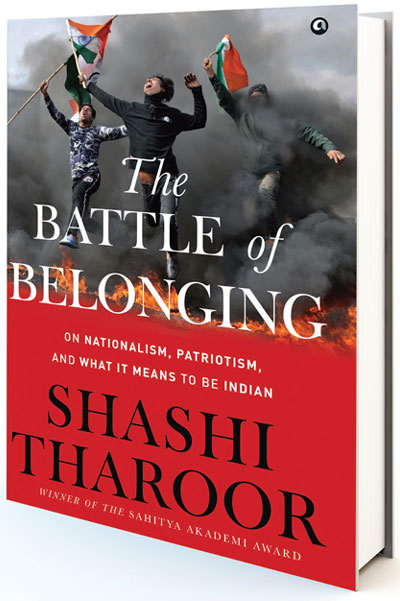National security, nationalism and the idea of India
 Ghazala Wahab
Ghazala Wahab
In a year where bad news piled upon worse news, one of the redeeming factors was the quality of books that came out. Though driven by the dwindling book trade, several publishers opted for digital publishing, towards the end of the year, print copies started to come in. With books filling the hollowness created by Covid-imposed restrictions, we started a dedicated books’ section in FORCE in September. The idea was to create a bridge of books between learning and our core readership.
Of course, there was uncertainty about sustainability of this section. Would we get enough books month after month to feature here? Would readers get drawn to books or will these pages be skipped? As is evident from this first issue of 2021, our doubts were unfounded. Not only are good books being written/ published, on a regular basis, FORCE readers have been responding warmly to this section, to the extent that some write to us asking if we can facilitate discounts on certain publications! Of course, we cannot.
In the last month, three books drew my attention—Dr N.C. Asthana’s National Security and Conventional Arms Race: Spectre of a Nuclear War (extract in the preceding pages), Shashi Tharoor’s The Battle of Belonging: On Nationalism, Patriotism, and What it Means to be Indian and Aakar Patel’s Our Hindu Rashtra: What it is. How We Got Here. I will talk about the first two here.
 Dr Asthana is that rare breed of Indian Police Service officers who combine erudition with candour to produce a fearless mix of incisive and intelligent arguments. A writer of reference books during his career (he has 48 of them to his credit, in addition to 78 research papers), he has transformed into a strategic analyst post-retirement, plunging headlong into a subject that has been the preserve of retired diplomats and military officers so far. Perhaps, it is fitting too. With military officers focussed on the past, someone has to look at the future.
Dr Asthana is that rare breed of Indian Police Service officers who combine erudition with candour to produce a fearless mix of incisive and intelligent arguments. A writer of reference books during his career (he has 48 of them to his credit, in addition to 78 research papers), he has transformed into a strategic analyst post-retirement, plunging headlong into a subject that has been the preserve of retired diplomats and military officers so far. Perhaps, it is fitting too. With military officers focussed on the past, someone has to look at the future.
Since Asthana is used to writing reference books, National Security and Conventional Arms Race encapsulates a wide range of subjects from possibilities of an accidental war because of public jingoism fanned by opportunist politicians, which in turn has weakened the nation to India’s intellectual and physical ignorance about nuclear warfare; ill-preparedness of Indian armed forces to such an extent that even Pakistan is hard to defeat in war, with special sections dedicated to the Indian Air Force and the army; the growing threat from China and why he thinks that it is better to seek a peaceful relationship with that country than adopt a confrontationist posture; and a review of ballistic missile defence options and so on.
Both, the choice his of subjects and approach towards them, reflect courage and non-conformism. Asthana is also provocative and prescriptive in equal measure. For instance, he writes that ‘India must accept the emerging geopolitical reality that it will no longer be able to dominate its neighbourhood…’ Elsewhere he writes, ‘There is no reason that creating the office of the CDS can address the fundamental problems plaguing Indian armed forces in any way. Lacking any original thought, the government and its bureaucrats are staunch believers of a notion that improved coordination and synergy is the panacea for all the problems of the country.’
Quoting yet again from him, ‘Media and the opinion-builders wield tremendous power over the minds of the people for the simple reason that the latter lack any critical faculty of their own…’ hence, according to him, they, including the ‘usual cohorts of devotees of some Supreme Leader’ whip up the war hysteria. ‘However, they will undergo a rapid change of heart the moment the war starts intruding into their comfort zones or hurts their interests materially…’
Ideally, this 370-page all-encompassing book should have been broken down into at least three with each meriting a more substantive treatment. In its present form it appears to be a perfect introduction to the gamut of national security to a reader who has recently developed an interest in this subject. So not only one gets acquainted to various issues that plague India’s national security, one also gets a critical perspective. However, for discerning readers or policymakers, the book appears too crowded. And because Asthana attempts to address everything, the analysis appears to be just skimming the surface in places.
This brings to mind the question: who is the book targeted at? Like a reference book, is it targeted at students or UPSC aspirants? If that is the case, then the cost of the book at Rs 2,500 is too prohibitive. Besides, it will be a pity that a thought-provoking book of this nature does not reach a wider audience.
*****
 Half-way through his book, The Battle of Belonging, Shashi Tharoor quotes Kashmiri poet Agha Shahid Ali: ‘My memory keeps getting in the way of your history.’
Half-way through his book, The Battle of Belonging, Shashi Tharoor quotes Kashmiri poet Agha Shahid Ali: ‘My memory keeps getting in the way of your history.’
This succinct sentence sums up the battle of belonging in India. Post-modern history-writing in India by historians of a certain persuasion has been a deliberate project of creating the past which can fit the present narrative. The biggest and the most frustrating impediment in the path of this project has been the collective of personal memories, mostly handed down through generations.
Whether they are memories of brotherhood, inter-community interactions, commonality of religious practices or nebulous notions of nationalism; for a century now, they have been clashing with the deliberately woven history of religious subjugation, intolerance and inability to coexist. In today’s India, between memories and history, who would you trust?
Tharoor’s expansive work begins by chronicling the theoretical concept of nationalism, which expectedly emerged in the West, specifically Europe. Using his tenure at the United Nations, where he interacted and engaged with people from all over the world as the anchor, he builds his arguments on nationalism to show how even as an artificial construct (for purposes of politics), nationalism worldwide is a recent phenomenon. In India, he says, it emerged with the emergence of the ideas of Hindutva.
Making a distinction between nationalism and patriotism, he writes that while former is a politically conscious and often an opportunistic choice, latter is an instinct and exists with the existence of a person. If only the sloganeering crowd bent upon othering almost half of their compatriots would understand this.
While writing The Battle of Belonging, Tharoor assumes two personas, often interchangeably. One is the scholar-writer who writes with the twin benefits of erudition and experience; the other is the politician from the party that has been in the opposition for the last six years. As former, his arguments are deeply insightful, and even original in many parts. But as a politician, he often resorts to political-correctness and expediency. Hence, whenever one encounters Tharoor the politician in the book, a sense of disappointment creeps in, for two reasons:
One, by apportioning the entire blame for the current state of the nation on the personality of Prime Minister Narendra Modi, he seems to delink him from the process of exclusivism which started with the founding of the RSS. By doing this, he also ignores the majoritarianism that had started to creep into Indian politics and public life soon after Independence/ Partition, often with the connivance of the Congress politicians themselves. The fact that several of them rode two horses, secularism and communalism, is mentioned only in the passing. This takes away the sequence in which majoritarianism morphed into nationalism and how at the core of it lies nothing but communalism.
And two, political compulsions force a sense of soft nationalism on him when dealing with contentious contemporary issues like abolition of Article 370 from Kashmir in 2019. In fact, the section on current politics under Modi appears to be the weakest to me. The candour that is evident throughout the book is smothered here. I was particularly disappointed by the chapter on Kashmir where he broad-brushes the political dispute that is at the core of the problem, while dwelling too much on the legalities of Article 370 and its abolition. Similarly, he puts the entire blame for the insurgency on Pakistan and makes no reference to the history of Congress’ follies in the state which led to the uprising in 1989. Or the undercurrents of separatism through the 1960s.
To be fair, Tharoor has been as candid as he politically could have been. The Battle of Belonging is a timely book which needs to be widely read, its undercurrents of politics notwithstanding.
The Battle of Belonging
On Nationalism, Patriotism, and What it Means to be Indian
Shashi Tharoor
Aleph Book Company, Pg 408, Rs 799

